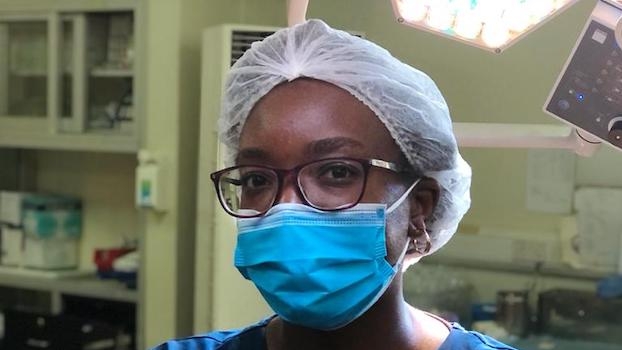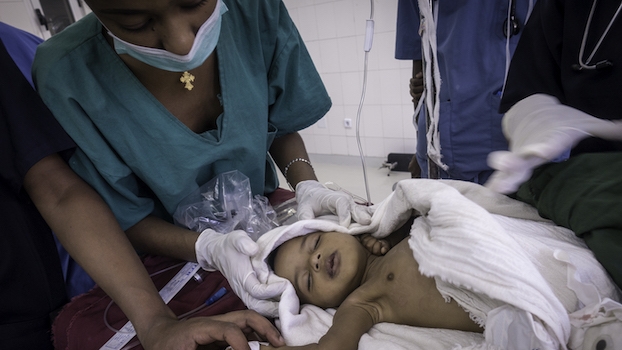NEW YORK – July 11, 2022 – Smile Train, the world’s largest cleft organization, today launches a new venture with Lifebox, the global nonprofit organization that makes surgery safer in low-resource settings, to distribute 11,000 pulse oximeters to 20 countries. This distribution, a key milestone of the Smile Train-Lifebox Safe Surgery and Anesthesia Initiative, will lead to 14 million safer surgeries over the next three years.
The Lifebox-Smile Train pulse oximeter is a low-cost, hospital-grade device for use in low-resource settings. As part of the Smile Train-Lifebox Safe Surgery and Anesthesia Initiative, oximetry and anesthesia safety training will be provided to health care professionals in the 20 low- and middle-income countries of focus.
Pulse oximeters rapidly measure the oxygen level of the blood and are essential for patient monitoring during anesthesia and in intensive care. They are also critical for treating conditions that affect blood oxygen levels, such as pneumonia and COVID-19. This easy-to-use device is the only piece of equipment included on the WHO Surgical Safety Checklist and represents the minimum standard for safe anesthesia. Despite their low cost, thousands of operating rooms and recovery beds still lack pulse oximetry – putting millions of lives at risk. A recent study shows that 15% of operating beds in low and lower-middle income countries lack a pulse oximeter, with 42% of recovery beds unable to provide vital monitoring after surgery1.
“For more than a decade, Smile Train has worked with Lifebox to equip hospitals across the globe with essential monitoring tools for children undergoing surgery,” said Smile Train President & CEO Susannah Schaefer. “We are thrilled to deepen our impactful anesthesia work with Lifebox. The launch of the Lifebox-Smile Train pulse oximeter reflects our commitment to make surgery safer for every child with cleft.”
Smile Train was a founding partner of Lifebox in 2011, distributing 2,000 pulse oximeters to its global network for safer anesthesia. In the years since, Lifebox has distributed more than 32,000 pulse oximeters to frontline healthcare providers, including 8,800 devices as part of a coordinated COVID-19 response by Smile Train and Lifebox for the identification and management of COVID-19 patients.
“In Africa, we bear an inequitable share of perioperative mortality. In my country, Kenya, many hospitals still do not have access to pulse oximetry in both operating rooms and post aneesthesia care units despite it being an essential device.” said Dr. Zipporah Gathuya, pediatric anesthesiologist, The Nairobi Hospital, Kenya and Smile Train Medical Advisory Board member. “If you do not have a pulse oximeter, you cannot provide safe surgery for your patient: It’s as simple as that. I am overjoyed to see Smile Train and Lifebox commit to improving pulse oximetry access.”
Investing in pulse oximeters pays tremendous dividends: they are low-cost, durable, highly valued, and can be rapidly used across clinical units. The launch of the Lifebox-Smile Train pulse oximeter is aimed at rapidly scaling up access to pulse oximetry for anesthesia and critical care.
“This will save lives. It is impossible to overstate the transformative impact that a pulse oximeter has on the safety of a patient during and after surgery,” said Lifebox Global CEO, Kris Torgeson. “I am enormously proud of Smile Train and Lifebox committing to addressing this critical gap in the safety of surgery and anesthesia.”
Lifebox-Smile Train pulse oximeters are field-tested devices that meet specifications for use in low-resource settings – with sturdy construction and rechargeable batteries that stay on when the power fails. Lifebox works with three manufacturers that meet these robust required specifications. Distribution of the Lifebox-Smile Train Pulse Oximeters is underway, with devices earmarked for anesthesia providers in Kenya, Somalia, Ukraine, and Honduras.
As part of the launch, Smile Train and Lifebox have released a report titled “A Critical Gap: Pulse Oximetry in Low- and Middle-Income Countries”. An online discussion with global experts on closing the oximetry gap will be held on 27 July.
About the Smile Train-Lifebox Safe Surgery and Anesthesia Initiative:
The Smile Train-Lifebox Safe Surgery and Anesthesia Initiative is a multi-year strategic partnership to elevate the quality and safety of cleft and pediatric surgery in more than 70 countries. Through capacity building, innovations, and research, the Initiative is strengthening the surgical systems of over 1,000 hospitals around the world. More information here.
About Smile Train:
Smile Train empowers local medical professionals with training, funding, and resources to provide free cleft surgery and comprehensive cleft care to children globally. We advance a sustainable solution and scalable global health model for cleft treatment, drastically improving children’s lives, including their ability to eat, breathe, speak, and ultimately thrive. To learn more about how Smile Train’s sustainable approach means donations have both an immediate and long-term impact, please visit smiletrain.org.
About Lifebox:
Lifebox is a global nonprofit that saves lives through safer surgery and anesthesia. Through tools, training, and partnerships, Lifebox strengthens surgical systems in low- and middle-income countries. Co-founded by Dr. Atul Gawande, Lifebox has worked in over 116 countries and trained more than 11,000 healthcare providers. To learn more about Lifebox, visit www.lifebox.org.
Media Contacts:
Kitty Jenkin
Lifebox
Nicole Bell
Smile Train
- Starr N, Capo-Chichi N, Moore J, Shreckengost CH, Fernandez K, Ambulkar R, et al. Perioperative Provider Safety in Low- And Middle-income Countries during the COVID-19 Pandemic: A Call for Renewed Investments in Resources and Training. Annals of Surgery. 2021 Dec 1;274(6):E525–627.



